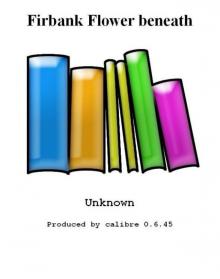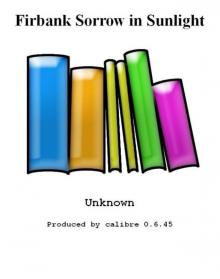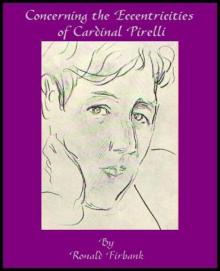- Home
- Ronald Firbank
Sorrow in Sunlight Page 2
Sorrow in Sunlight Read online
Page 2
“It seem no more dan yestidday,” she was holding forth gaily over a goblet of Sangaree wine, “it seem no more dan yestidday dat I put on me maiden wreath ob arange blastams to walk wid me nigger to church.”
Clad in rich-hued creepers, she was both looking and feeling her best.
“Sh’o,” a woman with blonde-dyed hair and Buddery eyes exclaimed, “it seem no more dan just like yestidday; dat not so, Papy Paul?” she queried, turning to an old man in a raspberry-pink kerchief, who displayed (as he sat) more of his person than he seemed to be aware of.
But Papy Paul was confiding a receipt for pickling yuccas to Mamma Luna, the mother of Bamboo, and made as if not to hear.
Offering a light, lilac wine, sweet and heady, Miami circled here and there. She had a cincture of white rose-oleanders, and a bandeau of blue convolvuli. She held a fan.
“Or do you care for anyt’ing else?” she was enquiring, automatically, of Mr. Musket (the father of three very common girls), as a melodious tinkle of strings announced the advent of the minstrels from Broken Hill.
Following the exodus roadward, it was agreeable to reach the outer air.
Under the high tress by the yard-door gate, the array of vehicles and browsing quadrupeds was almost as numerous as upon a market day. The quiet village road was agog, with bustling folk as perhaps never before, coming and going between the little Café of the “Forty Parrots,” with its Bar, spelled Biar in twinkling lights. All iris in the dusk, a few loosely-loinclothed young men, had commenced dancing aloofly among themselves, bringing down some light (if bitter) banter from the belles.
Pirouetting with these, Miami recognised the twinkling feet of her brother Charlie, a lad who preferred roaming the wide savannah country after butterflies with his net to the ever-increasing etiquette of his home.
“Sh’o, S’ciety no longer what it wa’,” the mother of two spare lean girls, like young giraffes, was lamenting, when a clamorous gong summoned the assembly to the festal board.
In the glow of blazing palm logs, stoked by capering pickneys, the company, with some considerable jostling, became seated by degrees.
“Fo’ what we gwine to recebe, de Lord make us to be truly t’ankful.” Mr. Mouth’s low voice was lost amid the din. Bending to the decree of Providence, and trusting in God for the welfare of his house, he was resigned to follow the call of duty, by allowing his offspring such educational advantages and worldly polish that only a city can give.
“An’ so I heah you gwine to leab us!” the lady at his elbow exclaimed, helping herself to a claw of a crab.
“Fo’ de sake ob de chillen’s schoolin’,” Mr. Mouth made reply, blinking at the brisk lightning play through the foliage of the trees.
“Dey tell me de amount of licence dat go on ober dah—” she murmured, indicating with her claw the chequered horizon; “but de whole world needs revising, as de Missionary truly say!”
“Inded, an’ dat’s de trute.”
“It made my cry,” a plump little woman declared, “when de Minister speak so serious on de scandal ob close dancing…”
“Fo’ one t’ing lead sh’o to de nex’!” Mr. Mouth obstrusely assented, turning his attention upon an old negress answering to the name of Mamma May, who was retailing how she had obtained the sunshade beneath which, since noon, she had walked all the way to the party.
“Ah could not afford a parasol, so Ah just cut miself a lil green bush, an’ held it up ober my head,” she was crooning in gleeful triumph.
“It’s a wonder, indeed, no one gib you a lif’!” several voices observed, but the discussion was drowned by an esoteric song of remote tribal times from the lips of Papy Paul:
“I am King Elephant-bag,
Ob de rose-pink Mountains!
Tatou tatouay, tatou…”
provoking from Miss Stella Spooner, the marvellous daughter of an elderly father, a giggle in which she was joined by the youngest Miss Mouth.
Incontestably a budding Princess, the playful mite was enjoying, with airy nonchalance, her initial experience of Society.
“Ob course she is very jeune,” Mrs. Mouth murmured archly, behind her hand, into the ear of Mr. Musket.
“It’s de Lord’s will,” he cautiously replied, rolling a mystified eye towards his wife (a sable negress out of Africa), continually vaunting her foreign extraction. “I’m Irish,” she would say: “I’m Irish, deah…”
“Sh’o she de born image ob her elder sister!”
“De world all say she to marry de son ob ole Mamma Luna, dat keep de lil shop.”
“Suz! Wha’ next?” Mrs. Mouth returned, breaking off to focus Papy Paul, apparently, already, far from sober. “I hav’ saw God, an’ I hav’ spoke wid de President, too!” he was announcing impressively to Mamma Luna, a little old woman in whose veins ran the blood of many races.
“Dair’s no trute at all in dat report,” Mrs. Mouth quietly added, signalling directions to a sturdy, round-bottomed little lad, who had undertaken to fill the gap caused by Primrose and Phoebe.
Bearing a pannier piled with fruit, he had not got far before the minstrels called forth several couples to their feet.
The latest jazz, bewildering, glittering, exuberant as the soil, a jazz, throbbing, pulsating, with a zim, zim, zim, a jazz all abandon and verve that had drifted over the glowing savannah and the waving cane-fields from Cuna-Cuna by the Violet Sea, invited, irresistibly, to motion every boy and girl.
“Prancing Nigger, hab a dance?” his wife, transported, shrilled: but Mr. Mouth was predicting a banana slump to Mrs. Walker, the local midwife, and paid no heed.
Torso-to-torso, the youngsters twirled, while even a pair of majestic matrons, Mrs. Friendship and Mrs. Mother, went whirling away (together) into the brave summer dusk. Accepting the invitation of Bamboo, Miami rose, but before dancing long complained of the heat.
“Sh’o, it cooler in de Plantation,” he suggested, pointing along the road.
“Oh, I too much afraid!”
“What for you afraid?”
But Miami only laughed, and tossed her hand as if she were scattering dewdrops.
Following the roving fireflies and adventurous flittermice, they strolled along in silence. By the roadside, two young men, friends, walking with fingers intermingled, saluted them softly. An admirable evening for a promenade! Indescribably sweet, the floating field-scents enticed them witchingly on.
“Shi!” she exclaimed as a bird skimmed swiftly past with a chattering cry.
“It noddin’, deah, but a lil wee owl!”
“An’ it to make my heart go so,” she murmured, with a sidelong smiling glance.
He had a new crimson loincloth, and a blood-pink carnation at his ear.
“What for you afraid?” he tenderly pressed.
“It much cooler heah, doh it still very hot,” she inconsequently answered, pausing to listen to the fretting of the hammer tree-frogs in the dusk.
“Dey hold a concert, honey lub, all for us.”
Rig a jig jig, rig a jig jig…
“Just hark to de noise!” she murmured, starting a little at the silver lightning behind the palms.
“Just hark,” he repeated, troubled.
Rig a jig jig, rig a jig jig…
V
Little jingley trot-trot-trot, over the Savannah, hey—!
Joggling along towards Cuna-Cuna the creaking caravan shaped its course. Seated in a hooded chariot, berced by mule-bells, and nibbling a shoot of ripe cane, Mrs. Mouth appeared to have attained the heights of bliss. Disregarding or insensitive to the incessant groans of her husband (wedged in between a case of pineapples and a box marked “lingerie”), she abandoned herself voluptuously to her thoughts. It was droll to contemplate meeting an old acquaintance, Nini Snagg, who had gone to reside in Cuna-Cuna long ago. “Fancy seein’ you!” she would say, and how they both would laugh.
Replying tersely to the innumerable “what would you do ifs” of her sister, supposing attacks from mask
ed bandits or ferocious wild animals, Miami moped.
All her whole heart yearned back behind her, and never had she loved Bamboo so much as now.
“—if a big, shaggy buffalo, wid two sharp horns, dat long, were to rush right at you?” Edna was plaguing her, when a sudden jolt of the van set up a loud cackling from a dozen scared cocks and hens.
“Drat dose fowl; as if dair were none in Cuna-Cuna!” Mrs. Mouth addressed her husband.
“Not birds ob dat brood,” he retorted, plaintively starting to sing.
“I t’ink when I read dat sweet story ob old,
When Jesus was here among men,
How He called lil chillens as lambs to His fold,
I should like to hab been wid dem den!
I wish dat His hands had been placed ahn my head,
Dat His arms had been thrown aroun’ me,
An’ dat I might hab seen His kind look when he said,
‘Let de lil ones come unto Me!’”
“Mind de dress-basket, don’t drop down, deah, an’ spoil our clo’,” Mrs. Mouth exclaimed, indicating a cowskin trunk that seemed to be in peril of falling; for, from motives of economy and ease, it had been decided that not before Cuna-Cuna should rear her queenly towers above them would they change their floral garlands for the more artificial fabrics of the town, and Edna, vastly to her importance, go into a pair of frilled “invisibles” and a petticoat for the first amazing time; nor, indeed, would Mr. Mouth himself “take to de pants” until his wife and daughters should have assumed their skirts. But this, from the languid pace at which their vehicle proceeded, was unlikely to be just yet. In the torrid tropic noontime, haste, however, was quite out of the question. Bordered by hills, long, yellow and low, the wooded savannah rolled away beneath a blaze of trembling heat.
“I don’t t’ink much ob dis part of de country,” Mrs. Mouth commented. “All dese common palms… de cedar-wood tree, dat my tree. Dat is de timber I prefer.”
“An’ some,” Edna pertly smiled, “dey like best de bamboo…”
A remark that was rewarded by a blow on the ear.
“Now she set up a hullabaloo like de time de scorpion bit her botty,” Mrs. Mouth lamented, and indeed the uproar made alarmed from the boskage a cloud of winsome soldier-birds and inquisitive paroquets.
“Oh my God,” Mr. Mouth exclaimed. “What for you make all dat dere noise?” But his daughter paid no attention, and soon sobbed herself to sleep.
Advancing through tracks of acacia-scrub or groves of nutmeg-trees, they jolted along in the gay, exalting sunlight. Flowers brighter than love, wafting the odour of spices, strewed in profusion the long guinea-grass on either side of the way.
“All dose sweet aprons, if it weren’t fo’ de flies!” Mrs. Mouth murmured, regarding some heavy, ambered, Trumpet flowers with a covetous eye.
“I trust Charlie get bit by no snake!”
“Prancing Nigger! It a lil too late now to t’ink ob dat.”
Since, to avoid overcrowding the family party, Charlie was to follow with his butterfly net and arrive as he could. And never were butterflies (seen in nigger-boys’ dreams) as brilliant or frolicsome as were those of mid-savannah. Azure Soledads, and radiant Conquistadors with frail flamboyant wings, wove about the labouring mules perpetual fresh rosettes.
“De Lord protect de lad,” Mr. Mouth remarked, relapsing into silence.
Onward through the cloudless noontide, beneath the ardent sun, the caravan drowsily crawled. As the afternoon advanced, Mrs. Mouth produced a pack of well-thumbed cards, and cutting, casually, twice, began interrogating Destiny with these. Reposing as best she might, Miami gave herself up to her reflections. The familiar aspect of the wayside palms, the tattered pennons of the bananas, the big silk-cottons (known, to children, as “Mammee-trees”), all brought to her mind Bamboo.
“Dair’s somet’in’ dat look like a death dah, dat’s dat’s troublin’ me,” Mrs. Mouth remarked, moodily fingering a greasy ace.
“De Almighty forgib dese foolish games!” Mr. Mouth protestingly said.
“An’ from de lie ob de cards… it seem as ef de corpse were ob de masculine species.”
“Wha’ gib you de notion ob dat?”
“Sh’o, a sheep puts his wool on his favourite places,” Mrs. Mouth returned, reshuffling slowly her pack.
Awakened by her Father’s psalms, Edna’s “What would you do’s” had commenced with volubility anew, growing more eerie with the gathering night.
“…if a Wood-Spirit wid two heads an’ six arms were to take hold ob you, Mimi, from behind?”
“I no do nothin’ at all,” Miami answered briefly.
“Talk not so much ob de jumbies, Chile, as de chickens go to roost!” Mrs. Mouth admonished.
“Or, if de debil himself should?” Edna insisted, allowing Snowball, the cat, to climb on to her knee.
“Nothin’, sh’o,” Miami murmured, regarding dreamily the sun’s sinking disk, that was illuminating all the Western sky with incarnadine and flamingo-rose. Ominous in the falling dusk, the savannah rolled away, its radiant hues effaced beneath a rapid tide of deepening shadow.
“Start de gramophone gwine, girls, an’ gib us somet’in’ bright!” Mrs. Mouth exclaimed, depressed by the forlorn note of the Twa-oo-Twa-oo bird, that mingled its lament with a thousand night cries from the grass.
“When de saucy female sing ‘My Ice Cream Girl,’ for’ sh’o she scare de elves.”
And as though by force of magic the nasal soprano of an invisible songstress rattled forth with tinkling gusto a music-hall air with a sparkling refrain.
“And the boys shout Girlie, hi!
Bring me soda, soda, soda,
(Aside, spoken) Stop your fooling there and let me alone!
For I’m an Ice Cream Soda Girl.”
“It put me in mind ob de last sugar-factory explosion. It was de same day dat Snowball crack de Tezzrazine record. Drat de cat!”
“O Lordey Lord! Wha’ for you make dat din?” Mr. Mouth complained, knotting a cotton handkerchief over his head.
“I hope you not gwine to be billeous, honey, afore we get to Lucia?”
“Lemme alone. Ah’m thinkin’.”
Pressing on by the light of a large clear moon, the hamlet of Lucia, the halting-place proposed for the night, lay still far ahead.
Stars, like many Indian pinks, flecked with pale brightness the sky above; towards the horizon shone the Southern Cross, while the Pole Star, through the palm-fronds, came and went.
“And the men cry Girlie, hi!
Bring me—”
“Silence, dah! Ah’m thinkin’…”
VI
Cuna, full of charming roses, full of violet shadows, full of music, full of Love, Cuna…!
Leaning from a balcony of the Grand Savannah hotel, their instincts all aroused, Miami and Edna gazed out across the Alemeda, a place all foliage, lamplight, and flowers. It was the hour when Society, in slowly parading carriages, would congregate to take the air beneath the pale mimosas that adorned the favourite promenade. All but recumbent, as though agreeably fatigued by their recent emotions (what wild follies were not committed in shuttered-villas during the throbbing hours of noon?), the Cunans, in their elegant equipages, made, for anyone fresh from the provinces, an interesting and absorbing sight. The liquid-eyed loveliness of the women, and the handsomeness of the men, with their black moustaches and their treacherous smiles—these, indeed, were things to gaze on.
“Oh ki!” Miami laughed delightedly, indicating a foppish, pretty youth, holding in a restive little horse dancing away with him.
Rubbing herself repeatedly, as yet embarrassed by the novelty of her clothes, Edna could only gasp.
“…,” she jabbered, pointing at some flaunting belles in great evening hats and falling hair.
“All dat fine,” Miami murmured, staring in wonderment around.
Dominating the city soared the Opera House, uplifting a big, naked man, all gilt, who was being bi
tten, or mauled, so it seemed, by a pack of wild animals carved in stone; while near by were the University, and the Cathedral with its low white dome crowned by moss-green tiles.
Making towards it, encouraged by the Vesper bell, some young girls, in muslin masks, followed by a retinue of bustling nuns, were running the gauntlet of the profligates that clustered on the curb.
“Oh, Jesus honey!” Edna cooed, scratching herself in an ecstasy of delight.
“Fo’ shame, Chile, to act so unladylike; if any gen’leman look up he t’ink you make a wicked sign,” Mrs. Mouth cautioned, stepping out upon the balcony from the sitting-room behind.
Inhaling a bottle of sal volatile, to dispel de megrims, she was looking dignified in a décolleté of smoke-blue tulle.
“Nebba do dat in S’ciety,” she added, placing a protecting arm around each of her girls.
Seduced, not less than they, by the animation of the town, the fatigue of the journey seemed to her amply rewarded. It was amusing to watch the crowd before the Ciné Lara, across the way, where many were flocking attracted by the hectic posters of “A Wife’s Revenge.”
“I keep t’inking I see Nini Snagg,” Mrs. Mouth observed, regarding a negress in emerald-tinted silk, seated on a public bench beneath the glittering greenery.
“Cunan folk dat fine,” Edna twittered, turning about at her Father’s voice:
“W’en de day ob toil is done,
W’en de race ob life is run,
Heaven send thy weary one
Rest for evermore!”
“Prancing Nigger! Is it worth while to wear dose grimaces?”
“Sh’o, dis no good place to be.”
“Why, what dair wrong wid it?”
“Ah set out to look fo’ de Meetin’-House, but no sooner am Ah in de street dan a female wid her har droopin’ loose down ober her back an’ into her eyes, she tell me to Come along.”

 The Flower Beneath the Foot
The Flower Beneath the Foot Sorrow in Sunlight
Sorrow in Sunlight Concerning the Eccentricities of Cardinal Pirelli
Concerning the Eccentricities of Cardinal Pirelli